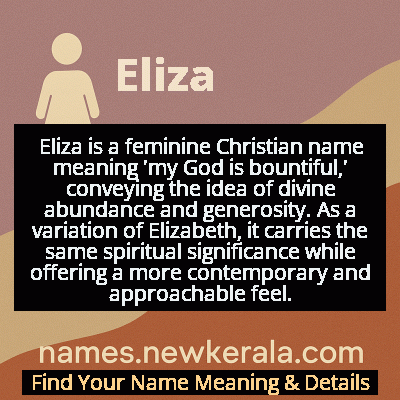Eliza Name Meaning & Details
Origin, Popularity, Numerology Analysis & Name Meaning of Eliza
Discover the origin, meaning, and cultural significance of the name ELIZA. Delve into its historical roots and explore the lasting impact it has had on communities and traditions.
Name
Eliza
Gender
Female
Origin
Christian
Lucky Number
8
Meaning of the Name - Eliza
Eliza is a feminine Christian name meaning 'my God is bountiful,' conveying the idea of divine abundance and generosity. As a variation of Elizabeth, it carries the same spiritual significance while offering a more contemporary and approachable feel.
Eliza - Complete Numerology Analysis
Your Numerology Number
Based on Pythagorean Numerology System
Ruling Planet
Saturn
Positive Nature
Ambitious, efficient, realistic, and authoritative.
Negative Traits
Materialistic, stressed, confrontational, and can be overly ambitious.
Lucky Colours
Dark blue, black.
Lucky Days
Saturday.
Lucky Stones
Blue sapphire, amethyst.
Harmony Numbers
2, 4, 6.
Best Suited Professions
Business leaders, managers, financial services, law enforcement.
What People Like About You
Leadership, determination, organizational skills.
Famous People Named Eliza
Eliza Doolittle
Fictional Character/Linguistics Student
Protagonist of George Bernard Shaw's 'Pygmalion', transformed from flower girl to refined lady
Eliza Hamilton
Philanthropist and Social Reformer
Co-founded New York's first private orphanage and preserved Alexander Hamilton's legacy
Eliza Lucas Pinckney
Agricultural Innovator
Developed indigo as a major cash crop in colonial South Carolina
Eliza Schuyler
Socialite and Philanthropist
Prominent member of Schuyler family during American Revolution era
Name Variations & International Equivalents
Click on blue names to explore their detailed meanings. Gray names with will be available soon.
Cultural & Historical Significance
The Victorian era saw Eliza become a standalone name rather than just a nickname, reflecting changing naming conventions and the growing appreciation for simpler, more approachable versions of traditional names. Throughout the 19th and 20th centuries, Eliza maintained its appeal through characters in literature and theater, most notably in Shaw's 'Pygmalion' and its musical adaptation 'My Fair Lady', which cemented the name's association with transformation and social mobility. The name's enduring popularity across different eras demonstrates its remarkable adaptability and timeless appeal.
Extended Personality Analysis
Individuals named Eliza are often perceived as intelligent, articulate, and socially adept, with a natural grace that draws people to them. They typically possess strong communication skills and emotional intelligence, allowing them to navigate complex social situations with ease. The name suggests someone who is both practical and imaginative, capable of balancing traditional values with progressive thinking. Many Elizas demonstrate resilience and adaptability, able to transform challenges into opportunities much like the literary character Eliza Doolittle.
There's often an undercurrent of determination beneath their charming exterior, suggesting inner strength and the capacity for significant personal growth. Their personality frequently combines warmth with intelligence, making them both approachable and respected in their personal and professional relationships. The name carries connotations of refinement without pretension, suggesting someone who values authenticity and genuine connection. These traits create a compelling personality profile that balances strength and sensitivity, making Elizas often successful in fields requiring both intellect and interpersonal skills.
Modern Usage & Popularity
In contemporary times, Eliza has experienced a significant resurgence in popularity, particularly in English-speaking countries where vintage names are enjoying renewed appreciation. The name consistently ranks within the top 200 girls' names in the United States and United Kingdom, appealing to parents seeking a name that is both classic and fresh. Its relatively short length and clear pronunciation make it accessible across cultures, while its literary and historical associations provide depth and character. Modern usage often favors Eliza as a standalone name rather than a nickname for Elizabeth, reflecting the trend toward more concise, distinctive names. The name's popularity has been bolstered by cultural phenomena like the musical 'Hamilton', which introduced Eliza Schuyler Hamilton to new generations. Current naming trends suggest Eliza will maintain its appeal as it strikes a perfect balance between traditional elegance and modern simplicity, making it a timeless choice for contemporary parents.
Symbolic & Spiritual Meanings
Symbolically, Eliza represents transformation, grace under pressure, and the journey toward self-realization. The name evokes images of flowering and blossoming, reflecting its meaning of divine abundance and growth. Like the biblical Elizabeth who experienced miraculous conception late in life, Eliza symbolizes unexpected blessings and the fulfillment of promises. The name carries strong connotations of linguistic and social transformation, inspired by Eliza Doolittle's journey from flower girl to refined lady in 'Pygmalion'. It suggests the ability to adapt and evolve while maintaining core identity and values, representing personal growth through education and experience. In a broader sense, Eliza represents the intersection of tradition and progress, honoring heritage while embracing change and new opportunities. The name symbolizes intellectual and emotional abundance, reflecting its fundamental meaning of 'God is bountiful' through the richness of character, experience, and potential it implies for those who bear it.

